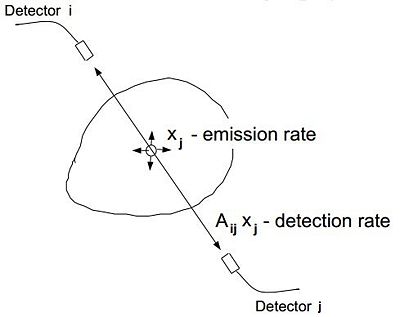- ↳ Topic 4: Discrete Parameter Signals and Systems
- ↳ Discrete Transforms
- ↳ Sampling and Scanning
- ↳ 2-D Filters
- ↳ 2-D Random Processes
- ↳ Filtered Random Processes
- ↳ Eigen-Signal Analysis and Examples
- ↳ Supplementary: Proof of Wiener-Khintchine Theorem
The Bouman Lectures on Image Processing
A sLecture by Maliha Hossain
Subtopic 1: Discrete Transforms
© 2013
Excerpt from Prof. Bouman's Lecture
Discrete Time Fourier Transform (DTFT)
The DTFT is the analogous transform for discrete time signals as the CTFT is for continuous time signals. Let $ x(n) $ be a discrete time signal. Then, its DTFT, $ X(e^{j\omega}) $ is given by
$ X(e^{j\omega}) = \sum_{n = -\infty}^{\infty}x(n)e^{-j\omega n} $
$ x(n) $ can be recovered using the inverse DTFT
$ x(n) = \frac{1}{2\pi}\int_{-\pi}^{\pi}X(e^{j\omega})e^{j\omega n} $
Note that the domain of the DTFT is continuous over (-∞,∞). The DTFT must not be confused with the Discrete Fourier Transform (DFT) which is a transform on a finite length sequence whereas the DTFT is a transform from -∞ to ∞.
Also note that the DTFT is periodic with period $ 2\pi $. Therefore,
$ X(e^{j\omega}) = X(e^{j\omega})\quad \forall \; \omega $
If you know the DTFT of a signal over some interval of length $ 2\pi $, then you know it for all $ \omega $. The periodicity of the DTFT means that functions such as $ rect(\omega) $ are not valid DTFT's.
Some Useful Discrete Time Functions and Transform Pairs
Discrete Space Fourier Transform and Properties
2-D Z-Transform
Relationship between Fourier and Z-Transforms
References
- C. A. Bouman. ECE 637. Class Lecture. Digital Image Processing I. Faculty of Electrical Engineering, Purdue University. Spring 2013.
Questions and comments
If you have any questions, comments, etc. please post them on this page
Back to the "Bouman Lectures on Image Processing" by Maliha Hossain


